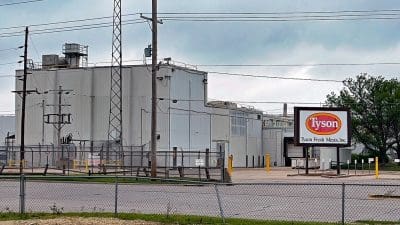A US meat giant is being sued by environmental groups which claim its stated commitments to achieve net zero emissions by 2050 are “misleading” consumers.
Tyson Foods is the world’s second largest meat company, producing about 20 percent of the beef, pork and chicken in the United States.
In 2021 it announced targets to achieve net-zero emissions by 2050 through increasing use of renewable energy and eliminating deforestation from its supply chain.
In 2023 it also unveiled its “climate-smart” beef program with a goal of reducing 30 percent of its beef production emissions by 2030.
The Environmental Working Group (EWG) last week announced it is suing Tyson Foods over its targets, claiming the company is taking “no meaningful steps” to achieve them.
The lawsuit also contends that “mass-produced beef can never be a climate-smart choice” because of the sheer volume of emissions produced in the process of raising cows on an industrial scale.
Other groups also involved in the lawsuit are Earthjustice, the Animal Legal Defense Fund, Edelson PC, and FarmStand.
The groups claim Tyson and other meatpackers are capitalising on consumer desires to buy products that will help the environment, but “without articulating a plan to eliminate the vast emissions associated with the many stages of its beef, chicken and pork production”.
“Recent studies show that consumers increasingly care about the climate and environmental impact of the products they purchase, including food, yet they cannot verify the truth of environmental advertising claims. This creates a market ripe for corporate greenwashing,” the lawsuit states.
Media reports from the US said Tyson has declined to comment on specifics of the lawsuit but did release a statement noting its “long history of sustainable practices that embrace good stewardship of our environmental resources”.
Some media reports have explained that accounting frameworks can allow companies aiming to achieve net-zero status to “offset” their own emissions through measures such as planting trees, employing carbon-removal technologies or getting carbon credits by investing in projects that reduce emissions elsewhere.
The EWG lawsuit contends that offsets to bring Tyson’s emissions to zero would be “both unfathomable and unavailable”, and have asked the Superior Court of the District of Columbia to bar the company from making “false or misleading marketing claims”.
Earlier this year New York Attorney General Letitia James sued JBS USA, claiming its climate claims that it will achieve net-zero greenhouse gas emissions by 2040 were deceptive.
In a statement at the time JBS said it disagreed with the allegations and said it would continue to work with farmers and others “to help feed a growing population while using fewer resources and reducing agriculture’s environmental impact”.

